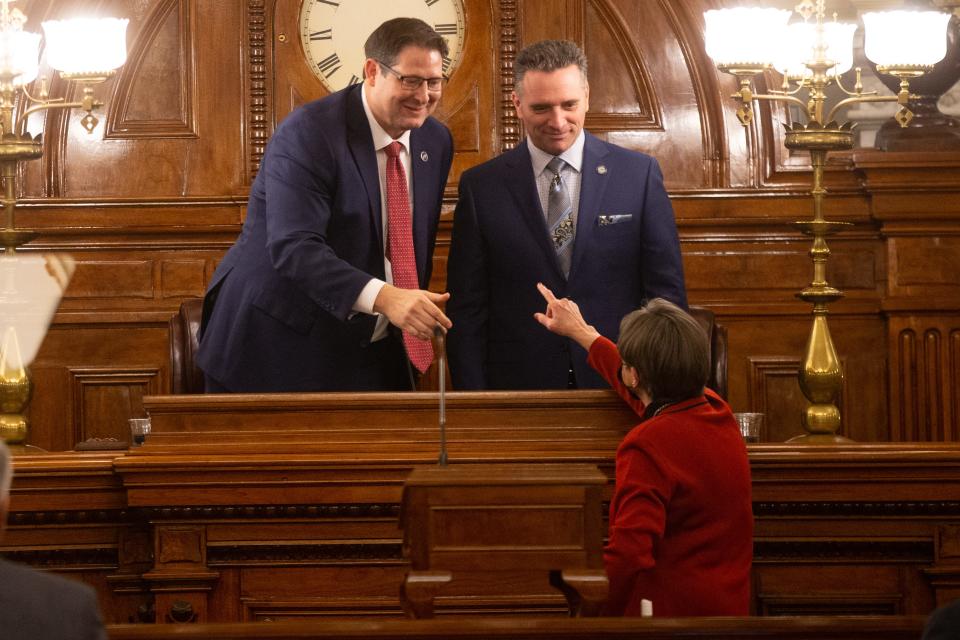Gov. Laura Kelly rejects Republican-authored congressional maps, setting up redistricting showdown
- Oops!Something went wrong.Please try again later.
Gov. Laura Kelly rejected Thursday a Republican-authored set of congressional districts, saying the maps ran afoul of the Kansas Legislature's own redistricting guidelines and illicitly divided Wyandotte and Douglas counties.
The move to veto the proposal was expected by top GOP legislators, who have defended the maps and believe they have enough support to override her decision.
Redistricting committees in both chambers adopt standards aimed at guiding the once-in-a-decade map-drawing process. In her veto message, Kelly said the Congressional map, dubbed Ad Astra 2, "does not follow these guidelines and provides no justification for deviation from those guidelines."
She pointed to a range of alternative maps that would ensure each of the state's four congressional districts have equal population "while protecting the core of the existing congressional districts and without diluting minority communities’ voting strength."
"I am ready to work with the Legislature in a bipartisan fashion to pass a new congressional map that addresses the constitutional issues in Senate Bill 355," Kelly said. "Together, we can come to a consensus and pass a compromise that empowers all people of Kansas."

The map backed by House and Senate Republican leaders controversially moves part of Wyandotte County from the 3rd District into the 2nd District.
This has prompted a torrent of criticism from Democrats and area residents alike, who believe the proposed lines would unfairly target neighborhoods with a high number of voters of color, diluting their voice in the political process.
Republicans have argued it actually increases the voting strength of minority residents in the 2nd District and that the goal in the redistricting process was to keep Johnson County in the 3rd District. It is mathematically impossible to keep both Wyandotte and Johnson counties in one district.
In a statement, Senate Republicans defended the map, saying it was reflective of the will of residents who did not want to see Johnson County split and preserved the existing core of each Congressional district.
"All in all, the Ad Astra 2 Map will serve Kansas well and accordingly, we will work to override the governor’s veto in short order," said Senate President Ty Masterson, R-Andover, Senate Majority Leader Larry Alley, R-Winfield, and Senate Vice President Rick Wilborn, R-McPherson.
But in her veto message, Kelly pointed to an array of predominately Hispanic neighborhoods "carved up" by the map and noted three conservative counties — Anderson, Franklin and Miami — that were added to the 3rd District.
The move makes the district more conservative, potentially undercutting the re-election efforts of U.S. Rep. Sharice Davids, Kansas' lone Democrat in Congress. Republicans have argued Davids would have won the proposed 3rd District in 2020.
In addition, much of Lawrence, as well as Jackson and Jefferson counties, would leave the 2nd District and move into the 1st District, which runs to the Colorado border, encompassing much of western Kansas.
More: Critics worry over plan to lump Lawrence with other college towns — and rural western Kansas
Critics of that move argue the college town shares little in common with rural swaths of the state, though Republicans framed it as a move to reunite the University of Kansas with its peer, Kansas State, in one district.
Kelly said the decision to move Lawrence served to water down common groups of western Kansas residents while "unnecessarily dividing communities of interest in Eastern Kansas."
House Speaker Ron Ryckman, R-Olathe, House Majority Leader Dan Hawkins, R-Wichita, and House Speaker Pro Temp Blaine Finch, R-Ottawa, meanwhile, said, "This isn’t the first time the legislature has had to step up to protect Kansans from Laura Kelly’s partisan agenda."
"It is no coincidence she pulled out the veto pen just hours after the ACLU told her to. It’s clear she is beholden to New York special interests," the House leaders said in a statement. "The legislature is bound to do what is best for Kansans and we won’t back down from that responsibility."
Attention shifts to override vote on redistricting
Democrats, however, cheered the veto decision, which came after days of lobbying from advocacy groups.
House Minority Leader Tom Sawyer, D-Wichita, said the map "was an insult to Kansans," while Senate Minority Leader Dinah Sykes, D-Lenexa, added the veto "provides us an opportunity to reflect on our failures and recommit ourselves to our professed principles of unprecedented transparency and accountability."
Now the ball is in the court of legislative Republicans, who will need a two-thirds majority in each chamber to override her veto. Masterson and Ryckman have said they believe they have the support to do this.
All Republican senators but one voted for the maps, though two members were absent. Masterson told reporters he expects those members will support the districts, allowing them to override.
The House, however, could be a tricky proposition. One Republican voted against the maps last week and two more voted present, with four others absent for a variety of reasons. Five more votes are needed to overcome Kelly's veto.
There is a broad agreement the matter will ultimately be litigated in court, however, either in federal court or at the Kansas Supreme Court.
It remains unclear whether a lawsuit is possible in state courts, though the Kansas Constitution doesn't address congressional redistricting. A lawsuit there would likely be predicated on whether the maps follow the guidelines Kelly cited in her decision to veto the bill.
An array of advocacy groups, as well as Democratic legislators, have said they are confident there are grounds for a successful challenge in either federal or state court.
Andrew Bahl is a senior statehouse reporter for the Topeka Capital-Journal. He can be reached at abahl@gannett.com or by phone at 443-979-6100.
This article originally appeared on Topeka Capital-Journal: Kansas Gov. Laura Kelly rejects GOP-authored congressional maps

